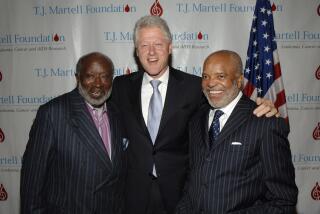Identity of ‘Deep Throat’ Is an Enduring Mystery
Richard Nixon is dead, Katharine Graham is dead, even Linda Lovelace is dead.
But Deep Throat? Still alive, and still a secret more than a quarter-century after his guidance helped Washington Post reporters Bob Woodward and Carl Bernstein break the Watergate story and unseat a president.
John Dean says he knows Deep Throat’s identity. And the former White House counsel, whose testimony against Nixon was a key moment in the saga, says he will reveal all in “The Deep Throat Brief.” The electronic book will be published June 17, the 30th anniversary of the Watergate break-in.
“He’s pretty certain he knows who it is,” said Scott Rosenberg, managing editor of the online magazine Salon, which will offer Dean’s book.
Of course, Dean was pretty certain in 1975, when he said Deep Throat was Earl J. Silbert, a Watergate prosecutor. And he was pretty certain in 1982, when he named Alexander Haig, who was eventually Nixon’s chief of staff and Ronald Reagan’s secretary of State.
Silbert and Haig denied it. This is to be expected. Everyone denies being Deep Throat. Including, Woodward says, Deep Throat.
The shadowy source “was risking a great deal personally and professionally,” he said in 1997. “You may assume that in the course of this he was not truthful with colleagues and family members and he denied that he had provided information.”
*
Nixon Believed Motive Was to Join the Media
Washington cannot abide a secret, especially one Dean has called “the best-kept secret in the history of the capital.” So while the particulars of Deep Throat’s exploits have faded in memory for many Americans, for others--politicians, historians and journalists--speculation about his identity remains a favorite parlor game.
Nixon was not immune. Monica Crowley, a young aide to the former president for four years before his death in 1994, quoted Nixon as saying Deep Throat was “someone on the inside.... One person who thought he had a lot to gain by spilling his guts to those two guys,” someone who wanted to be seen as a liberal because he wanted “a media career.”
Dean “was a traitor,” Nixon said, but Deep Throat “went even beyond that.”
Most of the public only came to know Deep Throat through “All the President’s Men,” the 1974 book by Woodward and Bernstein, and through the 1976 film based on the book in which the source was played by Hal Holbrook.
“Woodward had a source in the executive branch who had access to information at [the Committee to Re-Elect the President] as well as at the White House. His identity was unknown to anyone else,” the book says.
Woodward promised he would never identify the source or quote him, even anonymously. The source would confirm information secured elsewhere, and might “add some perspective.”
When he talked with his editors, Woodward called the source “my friend,” until Managing Editor Howard Simons dubbed him Deep Throat after the porn film in which Lovelace starred.
Deep Throat knew everything, from the involvement of top administration officials in the break-in at Democratic offices at the Watergate complex, to the erasures on tapes Nixon turned over to prosecutors under court order.
What else does “All the President’s Men” say of Deep Throat?
He smoked cigarettes. He did a mean impression of Nixon spokesman Ron Ziegler. And he had a penchant for cloak and dagger.
When Woodward wanted to meet, he moved a flower pot with a red flag to the rear of his apartment balcony. When Deep Throat wanted to meet, he got hold of the newspaper delivered to Woodward’s home, circled the number on Page 20 and drew clock hands in the circle.
Usually, they met at 2 a.m. in an underground parking garage.
Rabbi Baruch Korff, a die-hard Nixon supporter, said he believed that Nixon aide (and later, broadcast journalist) Diane Sawyer was Deep Throat. Sawyer laughed, and Woodward insisted the masculine pronouns he used for Deep Throat were no subterfuge--the source was a man.
Woodward also has insisted Deep Throat was an individual and not a composite, as contended by Ziegler, Nixon speech writer Raymond Price and David Obst, the book agent who helped Woodward and Bernstein sell “All the President’s Men.”
*
If the Source Survives, Scratch Casey Off the List
And we can assume Deep Throat is still alive. Woodward has said he will reveal Deep Throat’s identity only after the source is dead, because if he did it sooner, sources he deals with today might question whether he can keep a confidence.
So we can strike former CIA chief William Casey from the list of prospects. He died in 1987.
But there are plenty of other possibilities.
Conservative activist Howard Phillips and former Justice Department official Robert Mardian proposed White House lawyer Leonard Garment. “It’s not me. Honest,” said Garment, and he in turn has promoted White House aide John Sears.
“I categorically deny this,” Sears said in 2000.
Others besides Dean have named Haig. “Totally untrue,” Haig said. “My efforts then and now have been to preserve the presidency, not to tear it down.” He thought Deep Throat was with the FBI.
CBS newsman Mike Wallace reported that Deep Throat was most likely L. Patrick Gray, the acting FBI director who lived four blocks from Woodward.
Gray, of course, denied it.
FBI official W. Mark Felt, Assistant Atty. Gen. Henry Peterson, deputy White House Counsel Fred Fielding--all have been short-listed as possible Deep Throats.
Washington Post publisher Graham went to her grave without knowing the name of the key source in the biggest story her newspaper ever broke. Editor Benjamin Bradlee assured her the source was good, and that was enough.
Even Bradlee didn’t know Deep Throat’s identity until one spring day, years after Watergate, when he sat with Woodward on a park bench at lunch. When Bradlee asked, Woodward shared one of the greatest secrets of the century.
“I have never told a soul,” Bradlee said.
More to Read
Sign up for our Book Club newsletter
Get the latest news, events and more from the Los Angeles Times Book Club, and help us get L.A. reading and talking.
You may occasionally receive promotional content from the Los Angeles Times.






